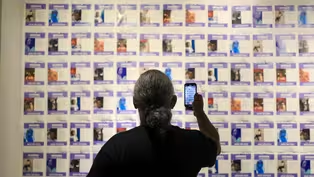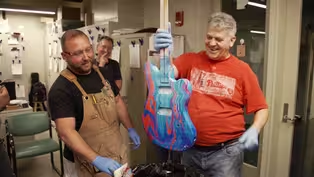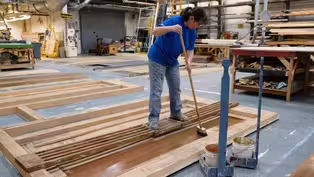Applause
Art Across Ohio: Djapo Cultural Arts Institute
Special | 8m 35sVideo has Closed Captions
Djapo Cultural Arts Institute in Cleveland creates new choreography.
The Djapo Cultural Arts Institute in Cleveland, Ohio, was founded in 2009 by artistic director Talise Campbell. Along with her husband and musical director, Weedie Braimah, Campbell recently created a new work, "Sandia: Of the Blood." This story is part of our special series - Behind the Scenes: Art Across Ohio.
Problems playing video? | Closed Captioning Feedback
Problems playing video? | Closed Captioning Feedback
Applause is a local public television program presented by Ideastream
Applause
Art Across Ohio: Djapo Cultural Arts Institute
Special | 8m 35sVideo has Closed Captions
The Djapo Cultural Arts Institute in Cleveland, Ohio, was founded in 2009 by artistic director Talise Campbell. Along with her husband and musical director, Weedie Braimah, Campbell recently created a new work, "Sandia: Of the Blood." This story is part of our special series - Behind the Scenes: Art Across Ohio.
Problems playing video? | Closed Captioning Feedback
How to Watch Applause
Applause is available to stream on pbs.org and the free PBS App, available on iPhone, Apple TV, Android TV, Android smartphones, Amazon Fire TV, Amazon Fire Tablet, Roku, Samsung Smart TV, and Vizio.
Providing Support for PBS.org
Learn Moreabout PBS online sponsorshipMore from This Collection
Take a look behind the scenes of Ohio artists as they work.
Art Across Ohio: Urban Arts Space exhibition
Video has Closed Captions
Two artists in Columbus curate a show at the Ohio State University's Urban Arts Space (6m 47s)
Art Across Ohio: STEM Guitar Lab
Video has Closed Captions
The STEM Guitar Lab shows students and teachers alike the technology used to build electric guitars. (8m 2s)
Art Across Ohio: Bowling Green State University Theatre
Video has Closed Captions
Kelly Mangan takes us behind the scenes of BGSU Theatre department. (5m 44s)
Providing Support for PBS.org
Learn Moreabout PBS online sponsorshipWe are here at the Pivot Center for Art, Music, Dance and Expression.
Tonight, we are starting a premiere piece called "Sandia: Of the Blood."
Company members know nothing about this piece.
Some of them may know a little bit if they've done some of our international travel voyages to West Africa.
But tonight, our dancers are going to get the opportunity to experience the music and the history and the folklore of Sandia before we start diving into some of the dance techniques.
(Speaking Manding) Our musical director, Weedie Braimah has gone to Mali numerous times and he's like an encyclopedia when it comes to music, when it comes to folklore.
So he's going to be diving into the music.
The dancers have to learn the rhythms.
The musicians have to learn the rhythms.
Everybody learns the songs.
(Singing in Manding language) My main job is to focus on how this music elevates them as artists and also how the way it elevates the audience.
We are preparing for a new piece.
It's a traditional folkloric piece that comes from Mali by way of the ethnic group of the Manding called Sandia.
The word Sandia means New Year, but it's done in honor of griots which are the oral historians.
The word for griot in the Manding language is djeli.
That's spelled d, j, e. l, i.
(Singing in Manding langauge) They're the ones to maintain the history, to maintain and knowledge, maintain the culture, maintain the preservation of narrative that's created within certain villages and certain areas (Singing in Manding language) Sometimes once a week or once a month, specifically in Mali in West Africa.
And people will go and the griots will show up and they will sing the praises of your family.
(Singing in Manding language) It's a communal event, so it's very lively.
(Singing in Manding language) My main goals for them to at least understand the timing of the music and how it goes, the way the song fits in to the music and how they're understanding the groove of the music.
(Singing in Manding language) They're going to get the history, they're going to get the folklore.
They're going to get the musical foundations of Sandia.
They're going to learn the rhythms because that enhances their ability to dance it with happiness, with Jubilee.
You see the difference?
The word Djapo itself means together.
And that's part of our mission, bringing individuals together to learn about the art, music, dance, history and folklore of Africa and throughout the diaspora.
If you want to learn about a people, if you want to learn about a culture, dive into the art.
It is almost there.
I promise you.
If you could just touch the floor just that one time on that first one... Oh my goodness.
We've made so much progress.
Our musical director has actually completed the orchestration of the music.
So I have actually created the village.
You know, as we talked about before, Sandia is is an event with families and people who live, you know, in a compound or within the same area.
So what I'm doing now is creating that celebratory village.
I'm recreating that space.
We're still kind of working through it in placement.
I haven't really placed individuals yet.
I'm just still in that place where I'm seeing where people, how they feel with the movement that's been given to them so that we have all the choreography that's set.
So now it's just kind of like moving through space to see where those final moments will be.
My philosophy is no paper and pen, so I want you to feel the music.
I want you to feel the song, understand the context and the foundational elements of the song and capture that and through practice.
It just happens and we get it.
I have to perform this for Dance Africa in Chicago.
I don't feel under the gun at all.
It's looking good.
It's just being able to bring the energy and to be able to show that for audiences, because that's my goal, is to make audiences feel something.
(Singing in Manding language).
We are complete.
It is a finished piece.
I'm so excited.
Like it's really finished.
The music has its voice.
The dancers understand and has implemented what they've learned into their body, and the song is now understood.
And the intent of what the song and the dance represents, the music represents, is now connected.
(Singing in Manding language).
What I want people to take away from this and the artists to take away from this is the beauty of longevity, tradition and speech, because the job of griot is to be able to speak and maintain.
(Singing in Manding language).
I want them to take away a piece of history.
A piece of Africa.
We've lost so much.
So if you can get a piece of happiness, a piece of history, a piece of folklore, and we've done our jobs.
(Singing in Manding language)


- Arts and Music
The Best of the Joy of Painting with Bob Ross
A pop icon, Bob Ross offers soothing words of wisdom as he paints captivating landscapes.












Support for PBS provided by:
Applause is a local public television program presented by Ideastream



